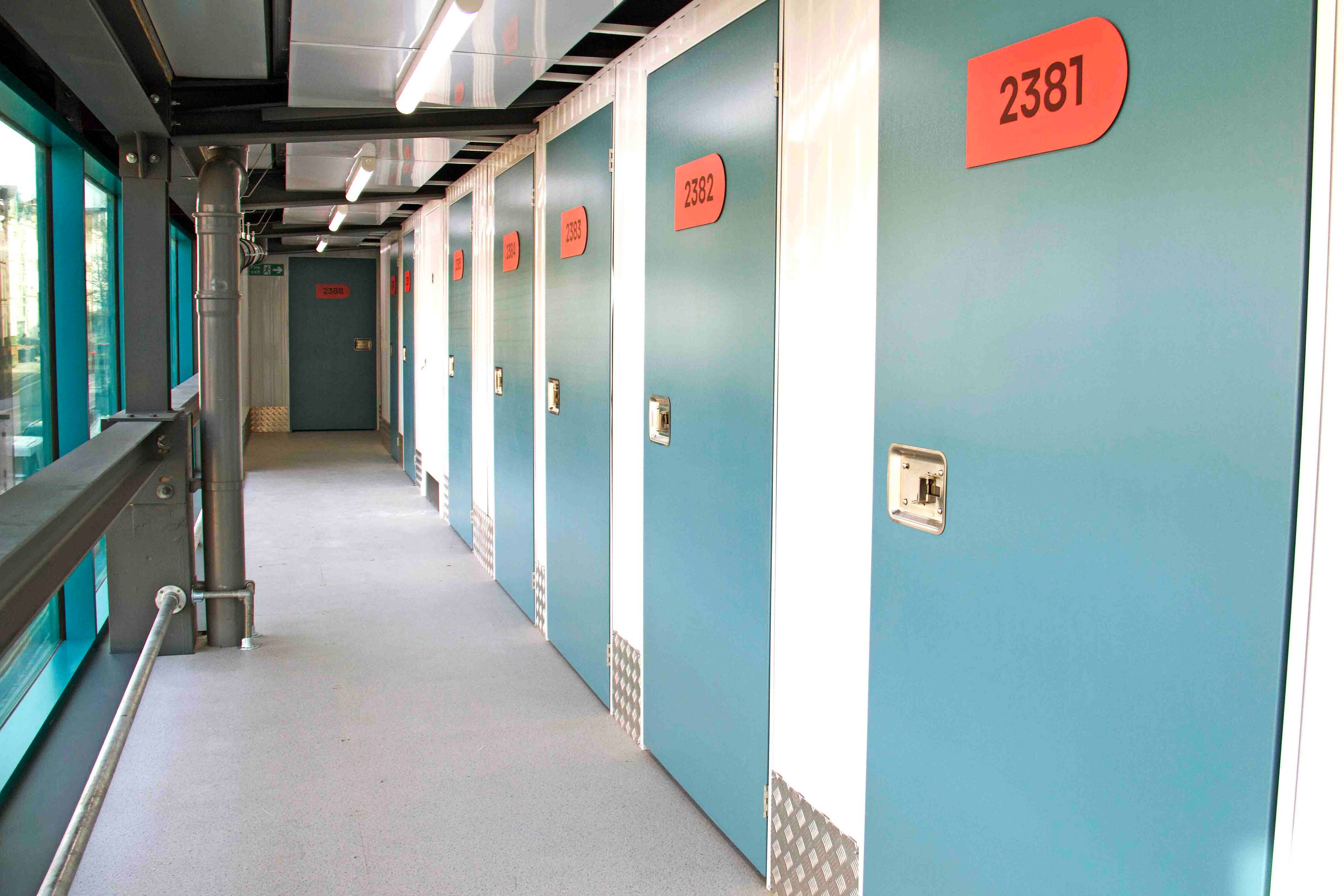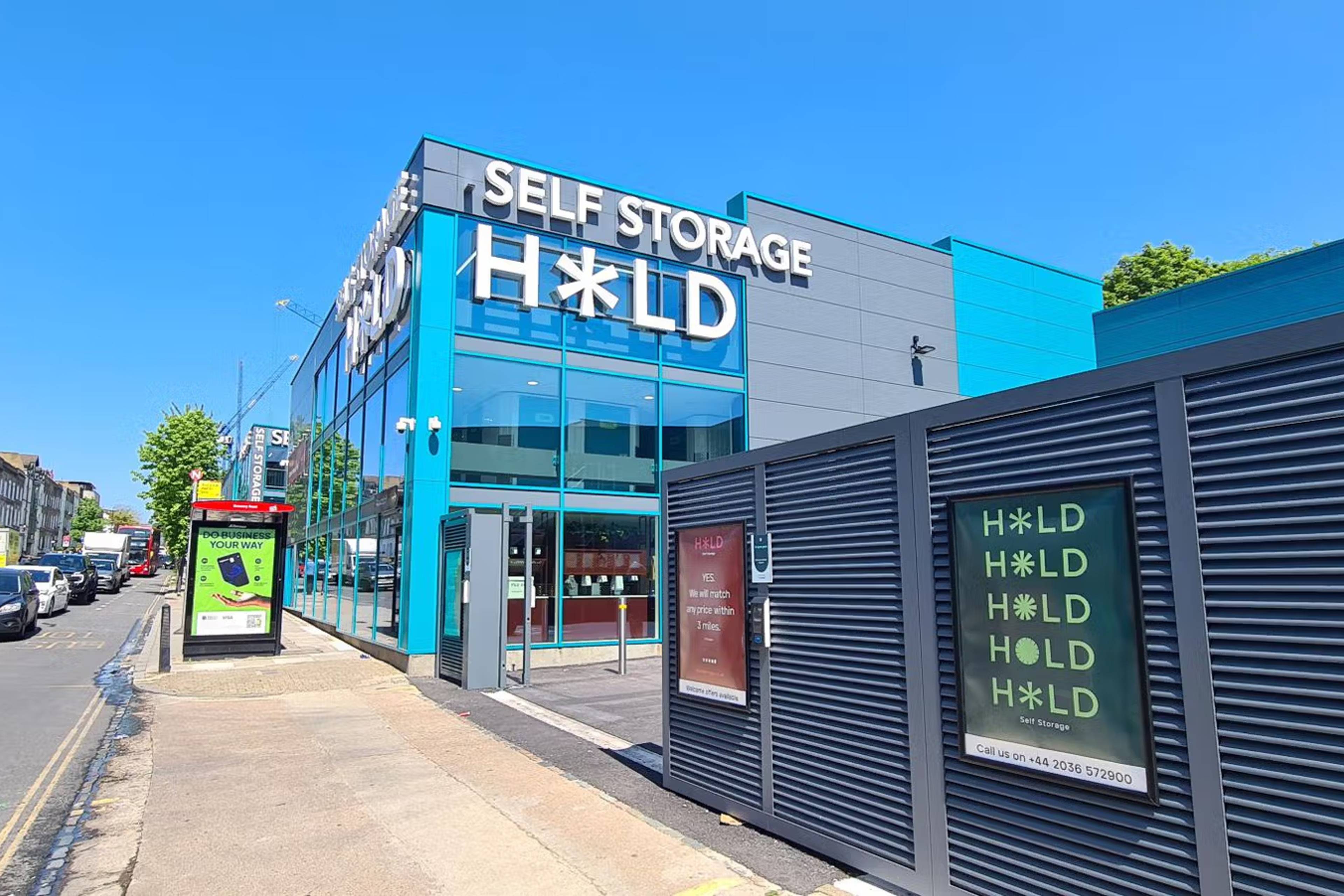*Updated on 19/02/2025 with key data based on the Self Storage Association Industry Report 2024.
We've scoured the most recent UK annual industry report to bring accurate, up-to-date info on UK storage unit prices. HOLD is here to demystify storage costs so you can find affordable solutions near you.
Table of contents
- How much is storage per month in the UK?
- Key factors affecting self storage prices
- Self storage prices by location
- Additional self storage costs to consider
- Exploring self storage options
- Tips for saving money on self storage
- How to choose the right storage solution
How much is storage per month in the UK?
The UK average is £26.23 per square foot annually (up 1% from last year), with price variations by unit size. A small storage unit (around 20-50 square feet) typically costs between £80-150 per month, while a medium-sized storage unit (75-150 square feet) ranges from £150-300 monthly. A larger storage unit (200+ square feet) generally starts from £300 per month.
However, these are just rough averages, and many factors contribute to the price of a unit.
Key factors affecting self storage prices
Storage location
Facilities closer to city centres (particularly in areas like London) tend to have higher prices due to the cost of real estate. Prices often decrease as you move further from major cities, especially to the North. Comparing rates across different locations can help you find the best deal.
Size of the storage unit
Self storage units come in various sizes, from small lockers to larger units. Larger units tend to be more cost-effective on a per-square-foot basis. Deciding on the right size for your needs is crucial to managing your costs.
Rental duration
The length of your rental agreement plays a role in pricing. Short-term stays may benefit from promotions, such as 50% off for the first 8 weeks, while long-term stays may qualify for additional discounts or incentives.
Additional services and insurance
Services like enhanced security, climate control, or insurance coverage add value but can increase costs. Be sure to check your storage provider's insurance policy, as the cost of cover depends on the replacement value of your items.
Our partner HoldAssure increases our liability coverage for items in your unit for a small fee, without requiring separate insurance.
Access hours and convenience
Facilities offering extended hours or 24/7 access may charge a premium for the added convenience. Remember, to consider how important flexibility is when selecting a storage facility. HOLD provides 24/hr access as part of its service, with no hidden fees, helping you lower total storage costs.
Market competition
In areas with many storage options, competition tends to lower prices as storage companies try to attract customers with better rates and promotions. In areas with fewer storage providers, prices may be higher due to limited choice.
That being said – despite having the highest number of storage facilities in the UK – self storage in London is more expensive on average. That's why HOLD offers a price match within 3 miles, so you can be assured you're getting a competitive rate.
Average storage costs across the UK
Average cost per square foot (annual rates)

*Prices referenced are based on the SSA UK's Annual Industry Report 2024. These are average figures, and your storage costs may differ based on location, storage size, insurance, and other factors.

Scotland (including Edinburgh and Glasgow)
- 25 sq. ft. – £11.21 weekly, £48.64 monthly
- 35 sq. ft. – £15.95 weekly, £69.11 monthly
- 50 sq. ft. – £20.26 weekly, £87.79 monthly
- 75 sq. ft. – £30.30 weekly, £131.30 monthly
The cost of living in Scotland is cheaper than England. This is reflected by the self storage prices in cities like Glasgow and Edinburgh.

Wales & West Midlands
- 25 sq. ft. – £9.04 weekly, £39.12 monthly
- 35 sq. ft. – £12.74 weekly, £55.30 monthly
- 50 sq. ft. – £18.19 weekly, £78.77 monthly
- 75 sq. ft. – £27.25 weekly, £118.12 monthly
With some of the UK's more affordable living areas, Wales and the West Midlands have some of the cheapest self storage costs in the UK.
Additional self storage costs to consider
Average storage costs can be helpful but are only the tip of the iceberg. There are many additional expenses associated with storage that vary by use case.
When planning for self storage, we recommend carefully assessing all potential costs beyond the basic rent.
Insurance
This is essential for protecting your stored items against potential risks. Whether you choose a provider recommended by the storage company or arrange your own insurance, ensuring the coverage matches the value of your belongings is key. Most self storage facilities (like HOLD) have insurance options.
Deposit
Some facilities may require a deposit or an upfront payment when you start renting. This could be the rent for the first few weeks or a month, depending on the company's policy. HOLD's deposit requirement is one month's rent for the unit you select.
Transport and moving
Getting your items to the storage facility might involve additional costs. You might need to hire a moving service, rent a van, or use your own vehicle if it's suitable. Some storage companies may offer recommendations or partnerships with local transport services for your convenience.
HOLD regularly works with London removals firms and will liaise with them on your behalf.
Packing materials
Proper packing can protect your belongings and make the best use of space. If you need boxes, bubble wrap, or tape, storage facilities often sell these items. Buying quality packing materials can safeguard your items and help organise your unit efficiently.
HOLD's online box shop has all the top-quality packing materials you need, whether you're moving house, or storing business stock.
Securing your unit
Ensuring your storage unit is securely locked is crucial. While some facilities may offer free options, you can easily purchase a padlock from us. The cost of a lock is a small price to pay for the security of your valuables.
Each of these factors contributes to the total cost of using self storage. While some costs are straightforward, others vary based on individual needs and the specifics of the storage facility.
Always review the details and ask questions to fully understand the expenses involved in storing your items.
Furniture storage costs
Furniture storage costs encompass more than just the rental fee for the space. Key additional expenses include
- Insurance for your items (which varies by their value)
- Transportation costs for moving furniture to and from the facility,
- A potentially higher rate for climate-controlled units that protect your items from environmental damage. All HOLD's facilities are fully climate-secure, ensuring the safety of your valuables.
- Packing materials to secure your furniture can also add extra costs.
Make sure to factor in these aspects for a clear picture of your furniture storage costs.
Exploring self storage options
When space at your home or business is tight, securing items away from your primary location is a great solution. While using a garage, loft, or basement might seem convenient, these places can pose risks like damage, loss, or theft.
What's more, excess items can clutter valuable living or working areas. While opting for a storage unit is a popular choice, it's worth considering the full range of storage options available to suit different needs.
Indoor self storage
This option involves secure, individual units within a larger warehouse. Protected by CCTV and alarm systems, these units are indoor, shielding your belongings from the weather.

A look at the Inside of HOLD's London facility close to the city centre
Storage unit size ranged widely, accommodating everything from a few personal items to the contents of a 3 bedroom house. Features may include ground floor access for heavy items and shelving to maximise space.
Suitable for – A wide variety of items including furniture, electronics, and personal belongings that require protection from the elements.
Business storage
Business storage solutions offer tailored support for business growth and operational efficiency. These spaces offer more than extra space, providing scalable units that adapt to your company's evolving needs.

Learn how HOLD meets the storage needs of London businesses like Tea Shirt.
Features may include dedicated loading bays, flexible leasing terms, inventory management, and climate-secure environments to protect sensitive business assets. HOLD has all the above – we'll also accept deliveries on your behalf, have mailbox rental, free WiFi, and a dedicated work zone.
Suitable for – Business inventory, office equipment, archived documents, seasonal stock, tools, and commercial assets requiring secure, scalable, and professional storage solutions.
Container storage
Consisting of secure, outdoor metal containers, this option is great for larger, less sensitive items. While some sites offer regular access, enhanced security features like CCTV and perimeter fencing, the outdoor setting might not be ideal for items susceptible to temperature changes or moisture.
Suitable for – Large items like vehicles, outdoor equipment, and bulky furniture.
Collection and storage (Box Storage)
A convenient service where the company supplies boxes for you to pack, which they then collect and store at their facility. Box storage is ideal if you seldom need access to your stored items, as retrieving them can incur additional costs.
Suitable for – Smaller items and those you don't need to access frequently.
Lockups
Smaller, garage-like storage spaces found in residential areas, often rented for shorter periods. While practical for storing items of lower value, security depends on the lock and door strength.
Suitable for – Items of lower value or those that don't require stringent security measures.
Removals depositories
These are secure, indoor warehouse spaces offered by removal companies. They provide a space where items can be stored during a home move. Access to your belongings is typically limited, and there may be fees for early retrieval.
Suitable for – Furniture and household items during transitions between homes, especially if home improvements are planned before moving in.
Tips for cost-effective solutions

Look for discounts and promotions
Many storage facilities offer first-month-free deals, student discounts, or seasonal promotions. For example, HOLD offers 50% off for the first 8 weeks plus occasional promotional discounts.

Pick the perfect unit size
Pick the perfect size – Imagine packing a suitcase. You wouldn't use a huge one for a weekend trip, right? The same goes for storage units (except a mistake is more costly!). Remember to use size guides or ask for advice to ensure you're not paying for unused space. HOLD's storage experts will ensure you get the unit best-suited to your needs.

Compare prices
Storage prices vary between providers, even within the same area. Check multiple companies to find the best rates and deals. HOLD offers a price match within a 3-mile radius, so if you find a lower price nearby, we’ll match it.

Understand your contract
Read the fine print. Knowing about any fees for early move-out or the policy on rate increases can save you money down the line. HOLD has no fixed contracts and our terms are straightforward. If you have any questions, our friendly team are more than happy to answer them.
How to choose the storage solution that's right for you

Remember, selecting the right storage involves more than just price. Think carefully about what matters most for your items.
- Size matters – First, think about how much stuff you have. A unit too small will be crammed, but too large, and you're wasting money. Use tools like HOLD's online unit size calculator. Alternatively, consult with your chosen facility to estimate the size you need.
- Accessibility – How often will you need to access your items? If frequent visits are planned, choose a facility that's close by and offers convenient access hours. Unlike most storage providers, HOLD offers 24/hr access for every self storage unit (upon request).
- Extra services – Some items need climate security, while others might require robust security measures. Decide which features are essential for your peace of mind and factor them into your decision.
By focusing on these aspects, you'll be able to find a storage unit that not only fits your budget but also perfectly aligns with your needs.
Good luck on your storage journey!
faqs
At HOLD, we don’t just provide units – our self storage service is tailored to make your life easier. Our team is dedicated to delivering a smooth, stress-free experience, whether you're storing a few boxes or need space for business inventory. From helping you choose the right unit size to giving you handy moving tips, we’re here to ensure you feel supported every step of the way.

Our storage experts bring a personal touch to every interaction. Whether you're new to storage or a long-time customer, we make sure you get the care and attention you deserve, making your storage experience as simple and hassle-free as possible. Take advantage of secure storage facilities, 24/hr access, and premier business storage. Get a free quote and book your self storage unit online today!


